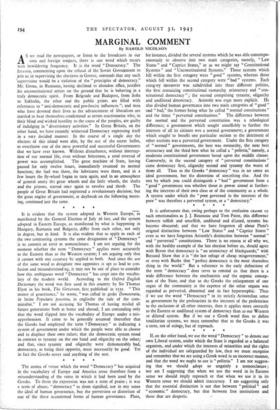It is unfortunate that, owing perhaps to the confusion causea
uy such emotionalists as J. J. Rousseau and Tom Paine, this difference between selfish and =selfish, undiluted and diluted, systems has become obscured; and that we have forgotten all about Plato's original distinction between "Law States " and " Caprice States " even as we have forgotten Aristotle's distinction between " normal " and " perverted " constitutions. There is no reason at all why we, with the healthy example of the last election before us, should agree with Byron that democracy is " an aristocracy of blackguards," with Bernard Shaw that it is " the last refuge of cheap misgovernment," or even with Burke that " perfect democracy is the most shameless thing in the world." But a reference to the early definitions of the term " democracy " does serve to remind us that there is a wide difference between the mechanistic and the organic concep- tion of the State, and that to the Greeks the enlargement of one organ of the community at the expense of the other organs was regarded as perverted, abnormal and in fact hypertrophic. Thus if we use the word " Democracy " in its strictly Aristotelian sense as government by the proletariate in the interests of the proletariate to the exclusion of all other interests, then it applies more correctly to the Eastern or undiluted system of democracy than to our Western or diluted system. But, if we use a Greek word thus to define totalitarian systems, we must remember that to the Greeks it was a term, not of eulogy, but of reproach.


























 Previous page
Previous page